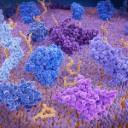-
Immunotherapy Indications Withdrawn
In recent months, drugmakers have announced they are withdrawing indications for four immune checkpoint inhibitors in consultation with the Food and Drug Administration. What does this mean for patients who are taking these drugs?
by Anna Goshua
-
Patient Advocates Tune in for Precision Medicine Primer
Scientists and physicians discussed advances in targeted therapies and immunotherapies, as well as the lessons COVID-19 research has taught to cancer researchers.
by Kevin McLaughlin
-
Immunotherapy Options for Breast Cancer
Two immune checkpoint inhibitors are now approved for treatment of some people with advanced breast cancer, but trial results have raised some questions.
by Anna Goshua
-
What Is Tumor Mutational Burden?
The Food and Drug Administration approved an immunotherapy drug for tumors with high tumor mutational burden regardless of tumor type. But some medical oncologists say it's not clear the biomarker is valid across all cancer types.
by Anna Azvolinsky
-
Treating Cancer Patients With COVID-19: A New York City Experience
An analysis of cancer patients who were infected with the coronavirus and treated at Memorial Sloan Kettering Cancer Center in New York City suggests certain risk factors may predict more severe COVID-19.
by Anna Azvolinsky
-
Exploring Immunotherapy for Triple Negative Breast Cancer
Following the approval of the first immunotherapy for breast cancer by the U.S. Food and Drug Administration in March 2019, experts at the San Antonio Breast Cancer Symposium discussed avenues for further development.
by Marci A. Landsmann
-
Navigating Hospital Discharge Decisions
Patients with advanced cancer often go to rehabilitation facilities after a hospital stay in hopes of gaining the strength for further treatment, but the majority do not go on to receive additional cancer therapy, a study reports.
by Ashley P. Taylor
-
Immunotherapy in the Elderly
Immune checkpoint inhibitors can be effective treatments for elderly people with some types of advanced cancer, but more information is needed on their risks and benefits in this group.
by Emma Yasinski
-
The Crowded Field of Checkpoint Inhibitors
Drug developers behind currently approved checkpoint inhibitors discuss the pros and cons of competition in the field.
by Kate Yandell
-
What Is Hyper-Progression?
Some researchers believe that immunotherapy occasionally causes cancer to grow faster, a phenomenon dubbed hyper-progression.
by Kate Yandell
Cancer Talk
Treating HER2-ultralow Breast Cancer
FDA approval expands treatment options for people with metastatic breast cancer that expresses minimal levels of HER2.
by Sandra Gordon
Lessons Learned as a Caregiver and PatientAfter caring for her husband during his cancer treatment, Miriam Díaz-Gilbert was prepared to face her DCIS diagnosis.
by Miriam Díaz-Gilbert
Screening Options for People With Dense BreastsReports on breast density inform women of their status but raise questions about what to do next.
by Robin Roenker
Injection Immunotherapies Get FDA ApprovalGiving immunotherapy drugs as injections, rather than intravenously, means patients can spend less time in the hospital or treatment center.
by Laura Gesualdi-Gilmore














